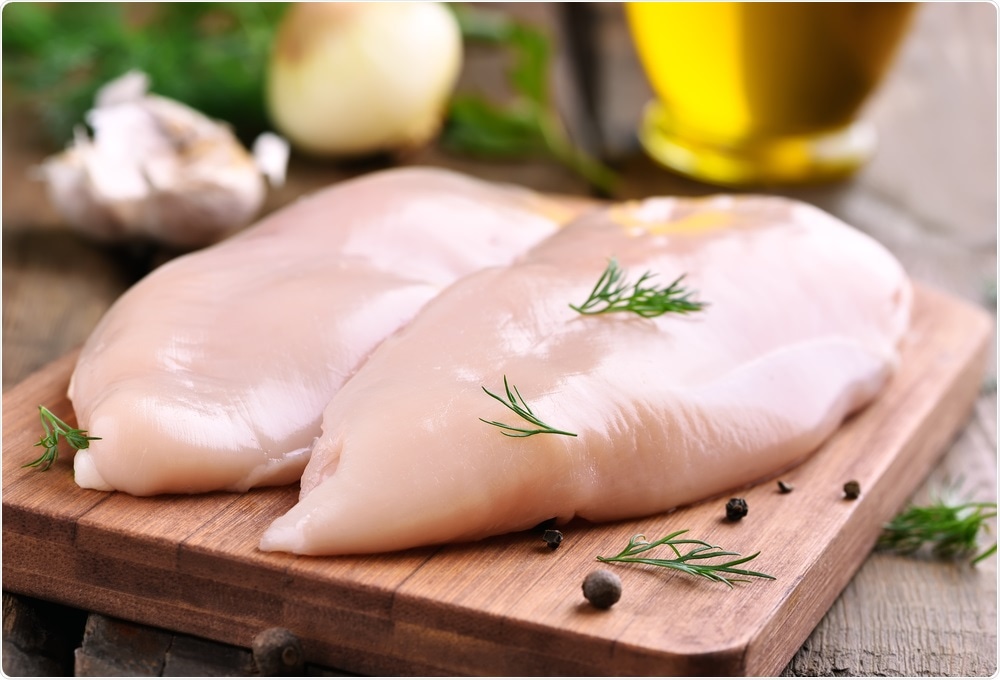‘Americans eat more chicken every year than any other meat’
The CDC estimates that approximately a million people become ill after eating contaminated poultry. According to the CDC, this is because “Chicken juices can spread in the kitchen and contaminate other foods, utensils and countertops,” and many people are unnecessarily increasing their risk of illness by not following simple preventative hygiene steps.
Americans eat more chicken every year than any other meat,” explained the CDC. “Chicken can be a nutritious choice, but raw chicken is often contaminated with Campylobacter bacteria and sometimes with Salmonella and Clostridium perfringens bacteria.”
They warn that consuming undercooked chicken or foods contaminated by raw chicken juices can cause food poisoning.
What bacteria are present in raw chicken?
Campylobacter
Campylobacter is one of four key global causes of diarrheal diseases, according to the World Health Organization (WHO), and is believed to be the most common bacterial cause of human gastroenteritis worldwide.
The bacteria can be found in poultry, cattle, pigs, sheep, and shellfish, as well as in cats and dogs. It has also been found in raw or contaminated milk or contaminated ice or water.
Campylobacter bacteria can be killed through heat and by cooking food properly. Symptoms of infection from Campylobacter may not arise until two to five days after infection. These include abdominal pain, fever, vomiting, and diarrhea.
 Tatiana Volgutov | Shutterstock
Tatiana Volgutov | Shutterstock
Salmonella
Salmonella is a bacterium that many people are familiar with. Most people infected with the bacteria do recover without treatment, with symptoms passing within four to seven days.
The CDC estimates that approximately 1.2 million illnesses, 23,000 hospitalizations, and 450 deaths are caused by Salmonella in the US per annum.
The two main types of Salmonella found in the US food industry are Salmonella serotype Thyphimurium and Salmonella serotype Enteritidis.
Clostridium perfringens
The third type of bacteria highlighted by the CDC is Clostridium perfringens. The cells that cause food poisoning can be killed by the cooking process, but the spores that grow into new cells are not eradicated this way. These spores grow prolifically at room temperatures.
Outbreaks of C. perfringens are often seen in hospitals, cafeterias, prisons, and nursing homes because food is often prepared and kept at warm temperatures for long periods of time before being served. Sources of C. perfringens include beef, poultry, and gravies.
What are the symptoms of food poisoning?
Symptoms of food poisoning include a temperature over 102ºF, diarrhea that lasts three days or more, blood in the stool, and prolonged bouts of vomiting. This can have serious consequences for children under the age of five, adults over 65, pregnant women and those with a suppressed immune system.
How to prevent food poisoning from raw chicken
There are a number of steps that you can take to lower the risk of food poisoning when handling and cooking chicken. The CDC website lists the following points to help people protect themselves and their homes from spreading harmful bacteria around the kitchen and cooking areas:
- Put the chicken inside a disposable bag before placing it inside shopping carts, baskets, or fridges to stop raw chicken juices from coming into contact with other food.
- Wash hands for 20 seconds in warm, soapy water before and after handling raw chicken.
- Check that the internal temperature of the chicken has reached a safe level (usually 165ºF) with a food thermometer before eating it.
- If frozen raw chicken is part of a microwaveable meal, handle it the same way as fresh, raw chicken, as well as following cooking guidelines accurately.
- Send chicken back at restaurants or other public dining venues if you feel it has not been cooked properly.
- Refrigerate or freeze leftover chicken within two hours. If the outside temperature is higher than 90ºF, reduce this time to within one hour.
The CDC emphasizes the importance of not washing raw chicken, citing that during the washing process, chicken juices can spread in the kitchen and contaminate utensils, countertops, and other food.
Washing cutting boards, utensils, dishes, and countertops with hot soapy water after preparing chicken is advised, along with never putting cooked food or fresh produce on surfaces that have also had raw chicken on them.
An easy way to ensure cross-contamination doesn’t occur is to use separate cutting boards for raw chicken and other produce.
However, the original tweet citing the harms of washing chicken, posted on the 26th April 2019, has attracted a significant amount of debate with users suggesting they will continue to wash raw chicken and soak it in salt, vinegar, and lemon or lime juice before cooking it.
This led to the CDC following up on their own tweet by saying: